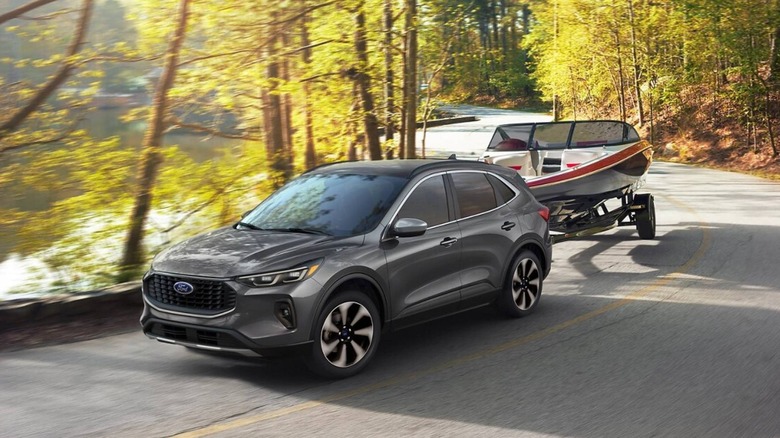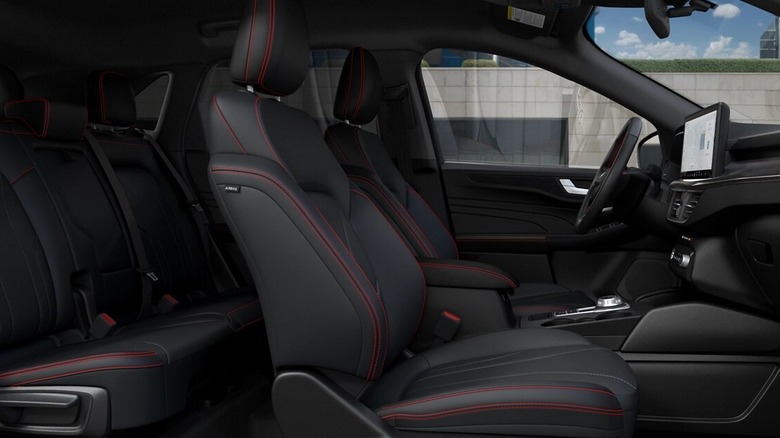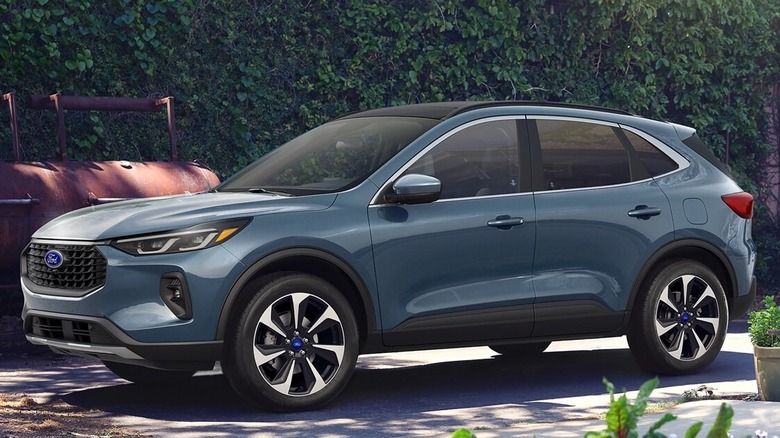Is The Ford Escape Hybrid Good On Gas? A Look At The SUV's Fuel Efficiency & Price
If you're shopping for a fuel-efficient SUV then you've probably noticed that hybrid models are everywhere. But before hybrids became as ubiquitous as smartphones, the Ford Escape Hybrid set the stage as the first-ever gas-electric SUV back in 2005. Now, after years of refinement, the Escape Hybrid remains a competitive option in the segment. The new model goes up against some of the best-selling and most affordable Hybrid SUVs, like the Toyota RAV4 Hybrid, Honda CR-V Hybrid, and the Hyundai Tucson Hybrid. To gain a competitive edge, the Escape delivers where it matters most — practicality, modern tech, and gas mileage.
The Ford Escape Hybrid is among the most fuel-efficient hybrid SUVs you can buy, with fuel economy ratings of 42 MPG in the city and 36 MPG on the highway, for a combined 39 MPG. This gives the SUV an impressive driving range of over 550 miles on a full tank. Power comes from a 2.5-liter inline four-cylinder engine that works with electric motors to generate a combined 192 horsepower. Power is delivered to either the standard FWD or available AWD via a CVT automatic transmission. With the AWD option, Escape Hybrid can go from 0-60mph in about 7.7 seconds. But how much will you actually save, and is it worth the price?
How does it compare to other hybrid SUVs?
The Escape Hybrid's combined 39 MPG puts it right in the mix with rivals like the Toyota RAV4 Hybrid, which gets 41 in the city and 38 MPG, and the Hyundai Tucson Hybrid, which delivers 38 MPG in both scenarios. The Escape is bested by the Kia Sportage Hybrid, which offers up to 43 MPG combined with front-wheel drive. However, some models like the Chevrolet Equinox Hybrid, fall behind at just 26 MPG in the city and 28 MPG on the highway. In Edmunds' real-world driving test, the Escape Hybrid averaged around 38.4 MPG – 0.6 MPg short of its rated fuel economy, which proves that the SUV's EPA ratings hold up under normal conditions.
One key factor behind the Escape Hybrid's efficiency is its smart hybrid system. Unlike mild hybrids, which only assist the gas engine, the vehicle features Ford's advanced fourth-generation full hybrid setup. This system allows the SUV to run on electric power alone at starting and at lower speeds, with the engine starting when the vehicle reaches a speed of about 25 mph. It also comes with a cool regenerative braking system that sends power back into the batteries when you step on the brakes. The Escape Hybrid features four EV modes, including an Auto EV mode, which lets the vehicle decide whether to use electric power or gas. Another cool mode is the EV charge mode, which allows drivers to charge the battery while they drive. Aside from the mainstream Escape Hybrid, buyers can opt for a Plug-in hybrid model with a more powerful motor and a larger battery — enough to provide 37 miles of all-electric driving.
Is the Ford Escape hybrid the price?
While the base Escape Active (non-hybrid) starts at $28,400, the Escape Hybrid ST-Line starts at $33,985—about $5,500 more. As you move up the trim levels, there continues to be a price gap, with the ST-Line Elite Hybrid costing $39,605, compared to $36,540 for its non-hybrid equivalent. The top-of-the-line Escape Plug-In Hybrid (PHEV), however, is priced at $39,895. While the hybrid models cost more upfront, the savings in fuel costs can help offset the difference in time, especially for drivers who do a lot of city driving.
Speaking of savings, the Ford Escape Hybrid has a reasonable cost of ownership. The total five-year cost of owning a Ford Escape Hybrid is around $37,953, or about $7,591 per year. This is a notable difference when compared to the Hyundai Tucson Hybrid, whose five-year costs are about $45,136, or $9,027 per year. The figures include depreciation, fuel, insurance, and maintenance. Thanks to its 39 MPG combined fuel economy, fuel savings are a big advantage of the Escape Hybrid. Owners can expect to spend less at the pump compared to the gas-only models. Other factors like insurance, trim level, drivetrain setup, and driving habits can also affect how much you'll spend over time.
Long-term value is another key factor. The Ford Escape Hybrid holds around 50% of its original value even after five years. This makes it a solid investment. Its hybrid batteries are known to last between 200,000 and 300,000 miles. With warranties covering 8 years or 100,000 miles, battery replacement isn't something most owners will worry about. Plus, with hybrid SUVs in demand — hybrid vehicles made up 10.6% of light-duty vehicle (LDV) sales in the United States in the third quarter of 2024— resale values tend to stay strong, especially for higher trims that have premium features. If you're planning to keep your SUV for years or resell it down the line, it appears the Escape Hybrid could be a smarter financial choice.


